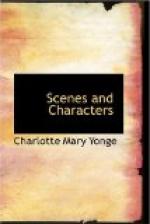The Maypole’s flowery wreaths
were seen;
Beneath the venerable yew
The stranger stood the sports to view,
Unmarked by all, for each was bent
On his own scheme of merriment,
On talking, laughing, dancing, playing —
There never was so blithe a Maying.
So thought each laughing maiden gay,
Whose head-gear bore the oaken spray;
So thought that hand of shouting boys,
Unchecked in their best joy—in noise;
But gray-haired men, whose deep-marked scars
Bore token of the civil wars,
And hooded dames in cloaks of red,
At the blithe youngsters shook the head,
Gathering in eager clusters told
How joyous were the days of old,
When Beechcroft’s lords, those Barons bold,
Came forth to join their vassals’ sport,
And here to hold their rustic court,
Throned in the ancient chair you see
Beneath our noble old yew tree.
Alas! all empty stands the throne,
Reserved for Mohun’s race alone,
And the old folks can only tell
Of the good lords who ruled so well.
“Ah! I bethink me of the time,
The last before those years of crime,
When with his open hearty cheer,
The good old squire was sitting here.”
“’Twas then,” another voice replied,
“That brave young Master Maurice tried
To pitch the ball with Andrew Grey —
We ne’er shall see so blithe a day —
All the young squires have long been dead.”
“No, Master Webb,” quoth Andrew Grey,
“Young Master Maurice safely fled,
At least so all the Greenwoods say,
And Walter Greenwood with him went
To share his master’s banishment;
And now King Charles is ruling here,
Our own good landlord may be near.”
“Small hope of that,” the old man said,
And sadly shook his hoary head,
“Sir Maurice died beyond the sea,
Last of his noble line was he.”
“Look, Master Webb!” he turned, and there
The stranger sat in Mohun’s chair;
At ease he sat, and smiled to scan
The face of each astonished man;
Then on the ground he laid aside
His plumed hat and mantle wide.
One moment, Andrew deemed he knew
Those glancing eyes of hazel hue,
But the sunk cheek, the figure spare,
The lines of white that streak the hair —
How can this he the stripling gay,
Erst, victor in the sports of May?
Full twenty years of cheerful toil,
And labour on his native soil,
On Andrew’s head had left no trace —
The summer’s sun, the winter’s storm,
They had but ruddier made his face,
More hard his hand, more strong his form.
Forth from the wandering, whispering crowd,
A farmer came, and spoke aloud,
With rustic bow and welcome fair,
But with a hesitating air —
He told how custom well preserved
The throne for Mohun’s race
Beneath the venerable yew
The stranger stood the sports to view,
Unmarked by all, for each was bent
On his own scheme of merriment,
On talking, laughing, dancing, playing —
There never was so blithe a Maying.
So thought each laughing maiden gay,
Whose head-gear bore the oaken spray;
So thought that hand of shouting boys,
Unchecked in their best joy—in noise;
But gray-haired men, whose deep-marked scars
Bore token of the civil wars,
And hooded dames in cloaks of red,
At the blithe youngsters shook the head,
Gathering in eager clusters told
How joyous were the days of old,
When Beechcroft’s lords, those Barons bold,
Came forth to join their vassals’ sport,
And here to hold their rustic court,
Throned in the ancient chair you see
Beneath our noble old yew tree.
Alas! all empty stands the throne,
Reserved for Mohun’s race alone,
And the old folks can only tell
Of the good lords who ruled so well.
“Ah! I bethink me of the time,
The last before those years of crime,
When with his open hearty cheer,
The good old squire was sitting here.”
“’Twas then,” another voice replied,
“That brave young Master Maurice tried
To pitch the ball with Andrew Grey —
We ne’er shall see so blithe a day —
All the young squires have long been dead.”
“No, Master Webb,” quoth Andrew Grey,
“Young Master Maurice safely fled,
At least so all the Greenwoods say,
And Walter Greenwood with him went
To share his master’s banishment;
And now King Charles is ruling here,
Our own good landlord may be near.”
“Small hope of that,” the old man said,
And sadly shook his hoary head,
“Sir Maurice died beyond the sea,
Last of his noble line was he.”
“Look, Master Webb!” he turned, and there
The stranger sat in Mohun’s chair;
At ease he sat, and smiled to scan
The face of each astonished man;
Then on the ground he laid aside
His plumed hat and mantle wide.
One moment, Andrew deemed he knew
Those glancing eyes of hazel hue,
But the sunk cheek, the figure spare,
The lines of white that streak the hair —
How can this he the stripling gay,
Erst, victor in the sports of May?
Full twenty years of cheerful toil,
And labour on his native soil,
On Andrew’s head had left no trace —
The summer’s sun, the winter’s storm,
They had but ruddier made his face,
More hard his hand, more strong his form.
Forth from the wandering, whispering crowd,
A farmer came, and spoke aloud,
With rustic bow and welcome fair,
But with a hesitating air —
He told how custom well preserved
The throne for Mohun’s race




